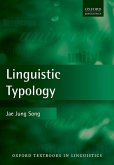Defaults in Morphological Theory
Herausgeber: Gisborne, Nikolas; Hippisley, Andrew
Defaults in Morphological Theory
Herausgeber: Gisborne, Nikolas; Hippisley, Andrew
- Gebundenes Buch
- Merkliste
- Auf die Merkliste
- Bewerten Bewerten
- Teilen
- Produkt teilen
- Produkterinnerung
- Produkterinnerung
This volume sets out four different default-based frameworks for describing morphology. Major proponents of these frameworks address a range of questions about the role of defaults in the lexicon, such as the place of morphology in the grammar and the challenge of meaning-form dissociations that plagues morphology.
Andere Kunden interessierten sich auch für
![The Oxford Handbook of Morphological Theory The Oxford Handbook of Morphological Theory]() The Oxford Handbook of Morphological Theory203,99 €
The Oxford Handbook of Morphological Theory203,99 €![Morphological Perspectives Morphological Perspectives]() Morphological Perspectives155,99 €
Morphological Perspectives155,99 €![Morphological Theory and the Morphology of English Morphological Theory and the Morphology of English]() Jan DonMorphological Theory and the Morphology of English140,99 €
Jan DonMorphological Theory and the Morphology of English140,99 €![The Oxford Handbook of Ellipsis The Oxford Handbook of Ellipsis]() The Oxford Handbook of Ellipsis261,99 €
The Oxford Handbook of Ellipsis261,99 €![Linguistic Typology Linguistic Typology]() Jae Jung SongLinguistic Typology169,99 €
Jae Jung SongLinguistic Typology169,99 €![The Romance Verb The Romance Verb]() Martin MaidenThe Romance Verb131,99 €
Martin MaidenThe Romance Verb131,99 €![The Oxford Handbook of Polysynthesis The Oxford Handbook of Polysynthesis]() The Oxford Handbook of Polysynthesis198,99 €
The Oxford Handbook of Polysynthesis198,99 €-
-
-
This volume sets out four different default-based frameworks for describing morphology. Major proponents of these frameworks address a range of questions about the role of defaults in the lexicon, such as the place of morphology in the grammar and the challenge of meaning-form dissociations that plagues morphology.
Produktdetails
- Produktdetails
- Verlag: Oxford University Press
- Seitenzahl: 330
- Erscheinungstermin: 26. Dezember 2017
- Englisch
- Abmessung: 239mm x 163mm x 33mm
- Gewicht: 748g
- ISBN-13: 9780198712329
- ISBN-10: 0198712324
- Artikelnr.: 48023234
- Herstellerkennzeichnung
- Libri GmbH
- Europaallee 1
- 36244 Bad Hersfeld
- gpsr@libri.de
- Verlag: Oxford University Press
- Seitenzahl: 330
- Erscheinungstermin: 26. Dezember 2017
- Englisch
- Abmessung: 239mm x 163mm x 33mm
- Gewicht: 748g
- ISBN-13: 9780198712329
- ISBN-10: 0198712324
- Artikelnr.: 48023234
- Herstellerkennzeichnung
- Libri GmbH
- Europaallee 1
- 36244 Bad Hersfeld
- gpsr@libri.de
Nikolas Gisborne is Professor of Linguistics and Head of Linguistics and English Language at the University of Edinburgh. His main interests are in event structure and its relationship to morphosyntax, the lexicon, and language change. His book The Event Structure of Perception Verbs was published by OUP in 2010. He is the co-editor, with Willem Hollmann, of Theory and Data in Cognitive Linguistics (Benjamins 2014). Andrew Hippisley is Chair of the Linguistics Department at the University of Kentucky, having previously worked a research fellow in the Surrey Morphology Group. He is the author, with Dunstan Brown, of Network Morphology (CUP 2012) and co-editor of Deponency and Morphological Mismatches (with Matthew Baerman, Greville G. Corbett, and Dunstan Brown; OUP 2007) and of The Cambridge Handbook of Morphology (with Gregory Stump; CUP 2016).
* Acknowledgements
* List of abbreviations
* List of contributors
* 1: Nikolas Gisborne and Andrew Hippisley: Defaults in linguistics
* 2: Geert Booij: Inheritance and motivation in Construction Morphology
* 3: Alain Kihm: Old French declension: A Word and Paradigm approach
and the role of syncretism and defaults in its rise and fall
* 4: Dunstan Brown: Inflectional classes and containment
* 5: Andrew Hippisley: Default inheritance and the canonical:
Derivation as sign builder and sign connector
* 6: Richard Hudson: French pronouns in cognition
* 7: Nikolas Gisborne: Defaulting to the new Romance synthetic future
* 8: Bertholdt Crysmann: Inferential-realizational morphology without
rule blocks: An information-based approach
* 9: Robert Malouf: Defaults and lexical prototypes
* 10: Farrell Ackerman and Olivier Bonami: Systemic polyfunctionality
and morphology-syntax interdependencies
* 11: Stephen R. Anderson: Defaults and morphological structure
* References
* Index
* List of abbreviations
* List of contributors
* 1: Nikolas Gisborne and Andrew Hippisley: Defaults in linguistics
* 2: Geert Booij: Inheritance and motivation in Construction Morphology
* 3: Alain Kihm: Old French declension: A Word and Paradigm approach
and the role of syncretism and defaults in its rise and fall
* 4: Dunstan Brown: Inflectional classes and containment
* 5: Andrew Hippisley: Default inheritance and the canonical:
Derivation as sign builder and sign connector
* 6: Richard Hudson: French pronouns in cognition
* 7: Nikolas Gisborne: Defaulting to the new Romance synthetic future
* 8: Bertholdt Crysmann: Inferential-realizational morphology without
rule blocks: An information-based approach
* 9: Robert Malouf: Defaults and lexical prototypes
* 10: Farrell Ackerman and Olivier Bonami: Systemic polyfunctionality
and morphology-syntax interdependencies
* 11: Stephen R. Anderson: Defaults and morphological structure
* References
* Index
* Acknowledgements
* List of abbreviations
* List of contributors
* 1: Nikolas Gisborne and Andrew Hippisley: Defaults in linguistics
* 2: Geert Booij: Inheritance and motivation in Construction Morphology
* 3: Alain Kihm: Old French declension: A Word and Paradigm approach
and the role of syncretism and defaults in its rise and fall
* 4: Dunstan Brown: Inflectional classes and containment
* 5: Andrew Hippisley: Default inheritance and the canonical:
Derivation as sign builder and sign connector
* 6: Richard Hudson: French pronouns in cognition
* 7: Nikolas Gisborne: Defaulting to the new Romance synthetic future
* 8: Bertholdt Crysmann: Inferential-realizational morphology without
rule blocks: An information-based approach
* 9: Robert Malouf: Defaults and lexical prototypes
* 10: Farrell Ackerman and Olivier Bonami: Systemic polyfunctionality
and morphology-syntax interdependencies
* 11: Stephen R. Anderson: Defaults and morphological structure
* References
* Index
* List of abbreviations
* List of contributors
* 1: Nikolas Gisborne and Andrew Hippisley: Defaults in linguistics
* 2: Geert Booij: Inheritance and motivation in Construction Morphology
* 3: Alain Kihm: Old French declension: A Word and Paradigm approach
and the role of syncretism and defaults in its rise and fall
* 4: Dunstan Brown: Inflectional classes and containment
* 5: Andrew Hippisley: Default inheritance and the canonical:
Derivation as sign builder and sign connector
* 6: Richard Hudson: French pronouns in cognition
* 7: Nikolas Gisborne: Defaulting to the new Romance synthetic future
* 8: Bertholdt Crysmann: Inferential-realizational morphology without
rule blocks: An information-based approach
* 9: Robert Malouf: Defaults and lexical prototypes
* 10: Farrell Ackerman and Olivier Bonami: Systemic polyfunctionality
and morphology-syntax interdependencies
* 11: Stephen R. Anderson: Defaults and morphological structure
* References
* Index








